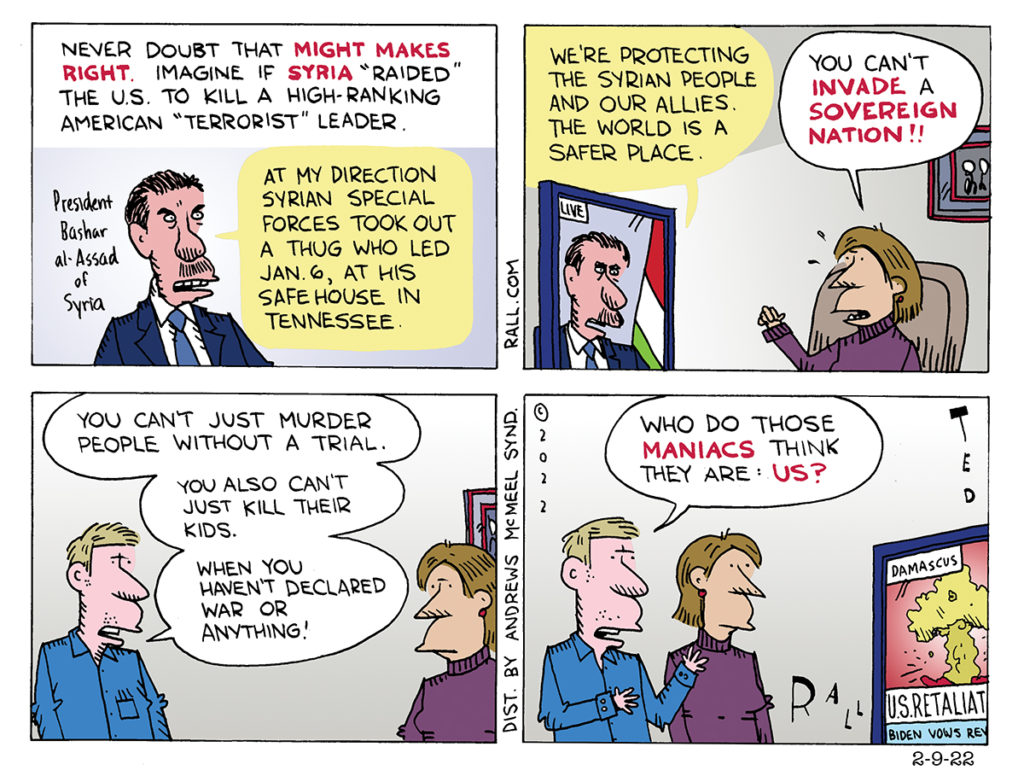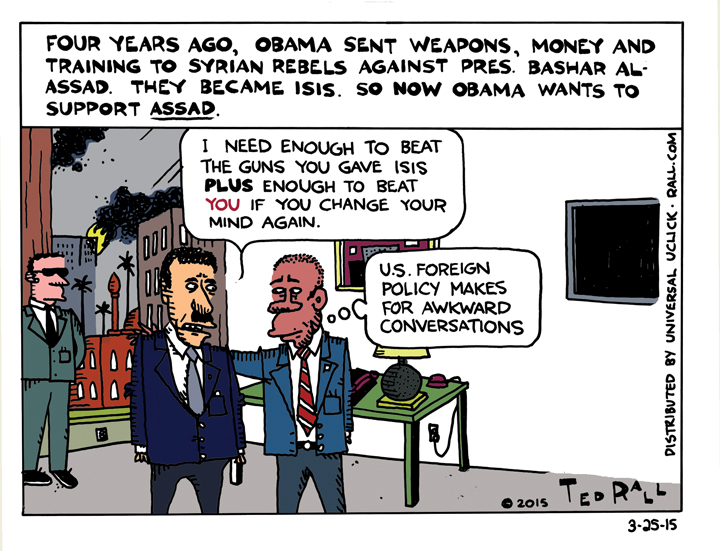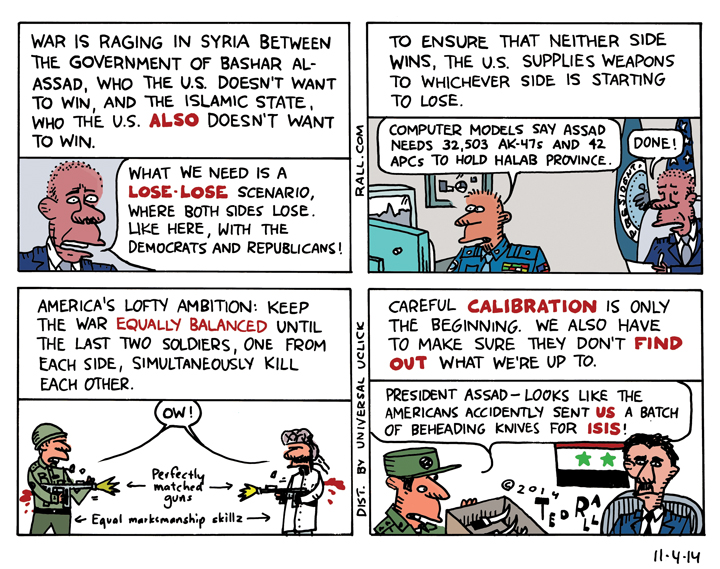For years, the U.S. and the West undermined and sabotaged the regime of Syrian dictator Bashar al-Assad. Now they’ve succeeded and radical jihadis have taken over. You just know what’s going to happen next.
Let’s Go Steady Until I Kill You
The overthrow of President Bashar al-Assad by Islamist rebels in Syria has outside factions scrambling for influence with the new rulers, HTS, who are former members of Al Qaeda and ISIS. The United States is among the suitors, offering to work with the Islamists. But these love affairs tend to have an expiration date.q
TMI Show Ep 35: “Assad Falls; What Now for Russia in the Middle East?”
Ties between Syria and Russia go back not only through the Soviet Union but even to Czarist Russia. Now, presumably because Russia is so focused on Ukraine, it was unable to save its ally, President Bashar al-Assad, from being deposed by Islamist insurgents. Assad is safely in Moscow but Damascus is a different matter.
Americas who remember the optimistic coverage of the fall of Baghdad in 2003 know better than to take similar images and coverage seriously now. International security analyst and Russia expert Mark Sleboda joins Ted Rall and guest co-host Robby West (filling in for Manila Chan) on “The TMI Show” to talk about the broad international implications of the collapse of the Syrian state, rising instability, and where Russia and Iran go now when it comes to influence in the Middle East.
TMI Show Ep 34: “The Talibanization of Syria”
This feels like a movie you’ve seen before: a secular socialist government where women and ethnic minorities have rights that are respected is targeted by the United States and its allies in large part because it shows that left-wing politics can be successful. The Carter administration armed the mujaheddin in Afghanistan, setting the stage for Al Qaeda and 9/11. The Bush Administration overthrew Saddam Hussein in Iraq, creating a failed state that became a vassal of Iran and a home for ISIS. Obama killed Muammar Qaddafi in Libya, creating a failed state where slave markets have reappeared and radical Muslim fundamentalists hold sway. Now an officially designated terrorist organization has, with the help of the US and Israel, overthrown Bashar al-Assad in Syria.
Will Hayat Tahrir al-Sham and its reformist leader Ahmad al-Sharaa keep their promise to limit their ambitions to Syria? Will they impose radical Taliban-style sharia law on Syria? What are the implications for Russia, which accepted Assad but did not provide sufficient air support to protect his regime? Israel has already started bombing Syria, saying that its 1974 peace deal was with the Assad government which no longer exists; will the war in Lebanon and Gaza spread into Syria even more? What are the security implications for Israel, which wanted this regime change, right next-door?
Who Do Those Maniacs Think They Are?
President Biden gleefully bragged about ordering the assassination of a high-ranking ISIS leader in Syria, which in case anybody forgot, is a sovereign state that is actually at war with ISIS. There is, apparently, little to no legal basis for what he did. But nobody seems to care.
The Killing of Abu Bakr al-Baghdadi: Illegal, Disgusting and Degenerate

As a society degenerates, life cheapens. The rhetoric that follows death coarsens. Respect paid to fallen rivals is replaced by triumphalism.
Historians observed this trend in ancient Rome. As republic turned to empire and domain expanded and so also arrogance and hubris, vanquished chieftains who previously might have been allowed to keep their thrones as the head of a vassal state were gruesomely executed at public triumphs. Early Christians got tossed to the lions. Gladiatorial combat became all the rage.
The assassination of Islamic State leader Abu Bakr al-Baghdadi by U.S. special forces operating under orders from President Trump reminds us that ours is a nation in moral decline—bloodthirsty and crass, functioning more like a vengeful crime family sending a message to its rivals than a nation of laws, a hell pit so devoid of basic ethics that it doesn’t even occur to its ruling party’s adversaries to raise the question of legality.
Nor does it cross the minds of journalists to mention the United States’ responsibility for the rise of ISIS. Rather than defend the secular socialist government of Bashar al-Assad or staying out of it, the Obama Administration armed and funded the Free Syria Army, parts of which allied with ISIS. This began the civil war. By most accounts al-Baghdadi was radicalized by his time in a hellish prison in U.S.-occupied Iraq—that’s on George W. Bush.
Inserting the caveat that ISIS committed many terrible crimes under al-Baghdadi ought not to be necessary here. Alas, such is the depth of our depravity that to omit such a mention is to risk being accused of approving of ISIS, its religious extremism, its kidnapping, enslavement, torturing and beheading because one suggests, as I do here, that a culture that had not lost its moral moorings would not tolerate what Trump did, what the media fails to question and what even those on what passes for the “left” not only tolerate but cheer.
So here: ISIS sucks. Moving on:
“Thank you and congratulations to our special operations forces and others involved in tracking and getting rid of ISIS/Daesh leader Baghdadi,” tweeted Tulsi Gabbard.
Getting rid of.
Gabbard is, by far, the least militaristic candidate for president.
“In tone and substance,” Vox noted, “the announcements of the deaths of Abu Bakr al-Baghdadi and Osama bin Laden couldn’t have been more different.” In 2011 Barack Obama used “nearly clinical tones” in his taped statement; Trump made fun of the dead jihadi, dubiously claiming that he left this world “whimpering and crying and screaming all the way” before detonating a suicide vest. He “died like a dog, died like a coward,” Trump told a press conference. Perhaps Caesar had something similarly classy to say about Vercingetorix.
If ISIS had been defeated as the president previously stated, the death of al-Baghdadi wasn’t a military victory. Worse than the BS was the undiluted repulsiveness of the president’s statement. Trump’s degeneracy did not spring out of thin air; rather, it was the culmination of his predecessors’ increasingly shameless contempt for the human lives we have given them the power to snuff out, and their discovery that holding up a severed head as a trophy can get you votes.
Obama played it cool. He put his surrogates in charge of his death-gloating. “If you are looking for a bumper sticker to sum up how President Obama has handled what we inherited, it’s pretty simple: Osama bin Laden is dead and General Motors is alive,” Vice President Joe Biden bragged as he stumped for Obama in 2012. No one in the media questioned the White House about the lack of legal justification for the operation.
“We came, we saw, he died,” Secretary of State Hillary Clinton cackled in 2011 after she watched on TV as a U.S. drone missile hit the Moammar Khaddafi’s car, driving him into the hands of American-armed radical Islamists who sodomized the Libyan leader with a bayonet. Running for president in 2016, she reminded audiences that she’d been in the Situation Room watching bin Laden being whacked.
“Good riddance,” George W. Bush said after Iraqi President Saddam Hussein was hung and decapitated. Bush invaded Iraq on the pretext that Saddam had weapons of mass destruction. In fact, Colin Powell admitted to associates that the evidence he presented in a ballyhooed speech to the United Nations was “bullshit.” Saddam never threatened the U.S. Impeaching Bush for conning America into war, Nancy Pelosi said in 2006, was “off the table.”
We have come a long way since 1981, when Ronald Reagan, a conservative Republican, signed Executive Order 12333, which states: “No person employed by or acting on behalf of the United States Government shall engage in, or conspire to engage in, assassination.”
E.O. 12333—which remains in force—was part of the aftermath of the Church Committee hearings of the 1970s, which exposed assassinations and other illegal acts committed by the CIA in Latin America and elsewhere at the height of the Cold War. American spooks conspired to murder political adversaries and heads of state, mainly on the left, all over the world. Back then, the political class had the grace to pretend to be ashamed.
When asked whether they had ordered extrajudicial assassinations, presidents of that era issued what came to be known as the Glomar response: they refused to confirm or deny. They would never have admitted, much less boasted about, murdering people. The press would never have looked the other way. If they had, the American people would not have tolerated either the politicians or the journalists.
(Ted Rall (Twitter: @tedrall), the political cartoonist, columnist and graphic novelist, is the author of “Francis: The People’s Pope.” You can support Ted’s hard-hitting political cartoons and columns and see his work first by sponsoring his work on Patreon.)
Reunited and It Feels So Good
Secretary of State John Kerry has signaled that the United States is reversing its policy of supporting the uprising against Syrian President Bashar al-Assad because the opposition became dominated by ISIS (the Islamic State of Iraq and Syria). Now the U.S. wants to keep Assad in power as a bulwark against the (previously) US-backed rebels.
SYNDICATED COLUMN: Ukraine Is Not a Revolution.

Mainstream news outlets in the United States, whose politics are closely aligned with those of the U.S. government, frequently criticize mainstream media outlets in Russia, whose politics are closely aligned to those of the Russian government. Current example: recent events in Ukraine.
“Russian officials have been doing everything they can to make it clear that they don’t recognize the legitimacy of this current parliament or its right to form an interim government,” NPR’s Corey Flintoff reported February 26th. “The impression that ordinary Russians would get from [their] news coverage is really that the Ukrainian Revolution is very much a thing to be feared.”
Flintoff made fun of Russian Prime Minister Dmitry Medvedev, who called the overthrow of Ukrainian president Viktor Yanukovych “essentially the result of an armed mutiny.” Russian Interior Minister Sergey Lavrov said it was “an attempt at a coup d’état and to seize power by force.”
Yet American media insist on the R-word: revolution.
Here we go again.
In U.S. and Western media, both the Tahrir Square “people power” demonstrations that removed Hosni Mubarak and the military coup that imprisoned the democratically elected Mohammed Morsi are called Egyptian “revolutions.” So is the Benghazi-based insurgency that toppled Libya’s Col. Moammar Gaddafi. If the civil war in Syria leads to the downfall of President Bashar al-Assad — even if, like Gaddafi, he gets blown up by a U.S. drone or a NATO fighter jet — they’ll call that a revolution too.
But those weren’t/aren’t revolutions. A revolution is “a forcible overthrow of a government or social order in favor of a new system.”
A new system. Those are the key words.
Even if it occurs as the result of dramatic street violence, a change in leaders doesn’t mean there has been a revolution. If the system doesn’t change much, a revolution has not taken place.
Egypt’s Tahrir Square was dramatic, an important event. But it wasn’t a revolution. This became evident last year, when General Abdel Fattah el-Sisi arrested and jailed President Morsi. If the 2011 Tahrir uprising against Mubarak had been a revolution, Sisi — a high-ranking officer who served most of his career under Mubarak — would not have been in the military at all, much less a figure powerful enough to stage a coup.
In a real revolution, the old system — all of its most important components — are replaced. Military leaders aren’t merely shuffled around or replaced; the army’s core mission and organizational structure are radically altered. It isn’t enough to rejigger boardrooms and change CEOs; the class structure itself — which defines every other role in society — is changed. (In China, for example, landlords went from a privileged class to impoverished pariahs after 1949.) Reforms don’t make a revolution. In a revolution, everything old gets trashed. Society starts from scratch.
The bar for whether a political change qualifies as a full-fledged revolution is extremely high.
And yeah, the definition matters. It matters a lot. Because revolution — capital-R, blood-in-the-streets, head-on-a-stick Revolution is by far the biggest threat to our system of corporate capitalism and the ruling classes who have been stealing almost every cent of the fortune we the people create with our hard work. If our business overlords convince us that revolution is something short of actually changing the system — in other words, getting rid of them — then they’re safe no matter what. Even if we protest, even if we turn violent, we will never truly emancipate ourselves.
Maybe they’ll pay higher taxes. For a little while. Until they bribe their way back out of them.
Until we destroy the 1%, stripping them of their money, power and social status, we will be their slaves. And that will never happen if we forget what revolution is.
Bearing in mind what revolution means, Ukraine comes nowhere close.
Consider this quote from Nicolai Petro, a politics professor at the University of Rhode Island, on Amy Goodman’s radio show:
“Yes, [Ukraine] is pretty much a classical coup, because under the current constitution the president may be—may resign or be impeached, but only after the case is reviewed by the Constitutional Court and then voted by a three-fourth majority of the Parliament. And then, either case, either the prime minister or the speaker of the Parliament must become the president. Instead, that’s not what happened at all. There was an extraordinary session of Parliament, after—it was held after most members were told there would be no session and many had left town. And then, under the chairmanship of the radical party, Svoboda, this rump Parliament declared that the president had self-removed himself from the presidency.”
Note the trappings of “legitimacy”: Constitutional Court, Parliament, preexisting political parties, laws created under the old regime.
Under a revolution, old institutions would be abolished. Anyone who had anything to do with them would be discredited, and possibly in danger of being executed. Parties, if there were any, would be new (unless they’d been operating clandestinely), with revolutionary politics and brand-new organizational structures. You certainly wouldn’t see old establishment figures like the recently released former prime minister, Yulia Tymoshenko (a leader of the “Orange Revolution” of 2004, which also wasn’t a revolution), seriously discussed as a potential new ruler.
Many Ukrainians know what revolution is — and they want one. “We need new people who can say no to the oligarchs, not just the old faces,” a 25-year-old economist told The New York Times. “The problem is that the old forces are trying to come back to take their old chairs,” said a shipping broker who waved a sign outside parliament that read: “Revolution, Not a Court Coup!”
U.S. reporters quote the would-be revolutionaries, but they can’t understand their meaning. After all, their country’s founding “revolution,” the American Revolution, was nothing of the sort. The elites became even more powerful. Slavery continued. Women still couldn’t vote. The poor and middle class didn’t gain power.
Just another coup.
(Support independent journalism and political commentary. Subscribe to Ted Rall at Beacon.)
COPYRIGHT 2014 TED RALL, DISTRIBUTED BY CREATORS.COM
SYNDICATED COLUMN: Breaking Bad
Obama’s Illegal War Against Syria
Barack Obama wants to fire cruise missiles at Syria. As president of the nation whose military possesses the most lethal firepower of any society in history, he obviously has the ability to start this war — his sixth major front, after Afghanistan, Iraq, Yemen, Libya and Pakistan — if he wants to. But does he have the legal right?
The answer is no. Not if the basic architecture of the Constitution, the separation of powers, remains in force. Not if the Founding Fathers’ originalist intent, and their understanding of English at the time, means anything. Not if America’s treaty obligations, which after ratification carry the full force of U.S. law, are more than pieces of paper.
Might makes right; the victor writes history. No doubt, in the perhaps-not-so-distant future, if the United States is formally constituted as an empire, with Syria one of its outlying provinces or a vassal state, no one will care how it went down back in 2013. Until then, however, it matters a lot. Attacking Syria without legal basis would have broad implications, and not just for the Syrians who will lose their lives, limbs and sanity.
Back here in what neofascist politicians and media mouthpieces call the Homeland, we Americans are watching our top officials and boldface notables brush off the basic legal underpinnings of the political culture with impunity.
Obama and his allies’ disdain for the law probably won’t spark much street protest, much less an uprising. (These days, you have to be a white Republican to provoke a demonstration against your wars.) Nevertheless, official lawlessness is corroding the system, hastening the coming rebellion just as surely as rust will eventually cause a bridge to collapse. When those at the top don’t follow their own rules — rules that they wrote, rules from which they benefit the most — why should anyone else? “They say I got to respect the system,” the Australian punk band the Saints sang, “but there ain’t no respect in that system for me.”
Obama and the other warmongers are counting on ignorance and confusion to make their case, but the rules of war are clear.
Attacking Syria would be illegal.
Obama and his surrogates keep saying that Obama has the “inherent power” to attack Syria (or any other country) in his role as commander-in-chief. He’s only asking Congress for approval, he says, because he’s a nice guy (and the political cover doesn’t hurt if and when the war turns sour, as they usually do).
In The Federalist Papers, Alexander Hamilton explained the thinking behind the new Constitution to 18th century newspaper readers. The president’s role as “commander-in-chief” was nothing close to the lofty Caesar-like rights Obama claim. So ceremonial as to be virtually insignificant, the commander-in-chief gig barely rated a mention: “While [the powers] of the British kings extends to the declaring of war and to the raising and regulating of fleets and armies,” Hamilton explained, “all which, by the Constitution under consideration, would appertain to the Legislature [Congress].”
In his book War Powers: How The Imperial Presidency Hijacked the Constitution, Peter Irons reminds us that under the U.S. Constitution, the president’s only military role is to repel an invasion — after it has occurred! — pending action by Congress. “The Framers,” writes Irons, “agreed that the president could act without a congressional declaration of war to repel an invasion but that only Congress could authorize the deployment of forces outside the nation’s territory in combat against foreign troops.”
The Founders were split on a number of issues. Slavery, for instance. On separation of powers and making war, they were virtually unanimous. Only a single delegate voted to vest the president with the right to wage war.
Obama has no “inherent right” to attack Syria or any other country.
Under the Constitution, Congress could do it. But the U.S. is also subject to treaty obligations that clearly block it from attacking Syria under present circumstances.
The Kellogg-Briand Pact of 1928, which the U.S. Senate ratified by an 85-1 vote, bans all acts of military aggression. Many of the Nazi leaders executed and imprisoned at Nuremberg were convicted for violating this Pact. It remains in force as international law.
The U.N. Charter mandates that all U.N. member states “refrain in their international relations from the threat or use of force against the territorial integrity or political independence of any state.” The Charter does not make exceptions for the three principal arguments Obama makes in favor of attacking Syria: punishment (for using chemical weapons), preemption (it’ll send a message to other possible future chemical weapons users, such as Iran and North Korea) and deterrence (it will deter Assad from attacking Jordan or Israel). To the contrary, the Fourth Geneva Convention outlaws “collective punishment” in which civilians are targeted to suffer for the offenses of their government.
During George W. Bush’s propaganda offensive leading to the 2003 invasion of Iraq, Bush and his allies (many of the same figures pushing to attack Syria) successfully convinced the public to sign off on their “preemptive war.” But neither Iraq then, nor Syria now, comes close to fitting the bill legally.
“There’s a well-accepted definition for preemptive war in international law,” Joseph Cirincione, Director of the Non-Proliferation Project of the Carnegie Endowment, said in late 2002. “Preemptive war is justified by an imminent threat of attack, a clear and present danger that the country in question is about to attack you. In such a case a preemptive attack is recognized as justifiable.”
That’s a very high bar. Even troops massed on your border don’t automatically qualify as an imminent threat under international law. You have to let the enemy hit you first, or have strong reason to believe they’re about to do so.
Now Obama can argue — and others will — that Geneva, Kellogg-Briand, the U.N. Charter, and even the U.S. Constitution are quaint, outdated relics, written by naïve men whose 20th century attempts to outlaw war are irrelevant today. If that’s what they think, then they should convince us to amend or annul them.
As long as these laws remain in force, and as long as Obama and other members of America’s ruling class continue to ignore them, an ugly day of reckoning draws closer.
P.S. to Mr. Obama: Please, Sire, may we miserable subjects of your Benevolent Self kindly see proof that the Syrian government (and not the rebels) carried out that poison gas attack the other day? How about some evidence?
Anything?
(Ted Rall’s website is tedrall.com. Go there to join the Ted Rall Subscription Service and receive all of Ted’s cartoons and columns by email.)
COPYRIGHT 2013 TED RALL





